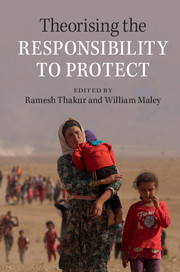Book contents
- Frontmatter
- Contents
- List of figures
- Notes on contributors
- Part I Context
- Part II The Responsibility to Protect, normative theory and global governance
- Part III The Responsibility to Protect and international social purposes
- 12 United Nations peacekeeping and the Responsibility to Protect
- 13 Humanitarian law, refugee protection and the Responsibility to Protect
- 14 Is the Responsibility to Protect doctrine gender-neutral?
- 15 The Responsibility to Protect: a Western idea?
- 16 Colonialism and the Responsibility to Protect
- Index
15 - The Responsibility to Protect: a Western idea?
from Part III - The Responsibility to Protect and international social purposes
Published online by Cambridge University Press: 05 August 2015
- Frontmatter
- Contents
- List of figures
- Notes on contributors
- Part I Context
- Part II The Responsibility to Protect, normative theory and global governance
- Part III The Responsibility to Protect and international social purposes
- 12 United Nations peacekeeping and the Responsibility to Protect
- 13 Humanitarian law, refugee protection and the Responsibility to Protect
- 14 Is the Responsibility to Protect doctrine gender-neutral?
- 15 The Responsibility to Protect: a Western idea?
- 16 Colonialism and the Responsibility to Protect
- Index
Summary
Introduction
The Responsibility to Protect has been hailed as one of the most significant normative developments in world politics since 1945, a ‘normative breakthrough that lays the foundation for a new international politics of mass atrocities’. Its endorsement at the 2005 United Nations World Summit provided an unprecedented acknowledgement by the global community that such responsibilities exist. This endorsement of R2P represents a quintessential cosmopolitan moment in world politics – it demonstrated recognition that there is an obligation to respond to harms visited upon others, and that this obligation is not confined by the political boundaries of the state.
At the same time, eddying around R2P since its inception has been the question of whether it represents a genuine universal consensus on how to respond to mass atrocity crimes. R2P remains dogged by accusations that it does not in fact represent a universal doctrine; rather it is but another iteration of the interests of the powerful over the weak cloaked in the language of universals, a means for the projection of the values and interests of the West. The backlash generated by NATO's action in Libya and the subsequent inability of the international community to reach a consensus to implement an R2P mandate in Syria added grist to the mill of such critiques. These differing interpretations of the purposes of R2P speak to a critical question that is central to any theoretical analysis of R2P: is it an innately Western idea?
This question can be addressed at an empirical level: who formulated, promoted and has supported R2P? To what extent has the development of R2P been driven by the West? However, the question can also be posed at a deeper level: can we say that the ethical premises that lie at the heart of R2P reflect the moral and political values of a particular society, that of the West? These questions bring to the fore the issue of the cultural politics of R2P. Despite the copious materials produced in recent years on R2P, this is an aspect of R2P which had been somewhat neglected; and yet the evolution of R2P is deeply embedded in the cultural politics of the international system. An important aspect of this is the degree to which the modern system was shaped by the expansion of the West and resistance to it.
- Type
- Chapter
- Information
- Theorising the Responsibility to Protect , pp. 285 - 304Publisher: Cambridge University PressPrint publication year: 2015
- 4
- Cited by



